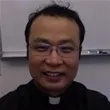Relevance of Religion Evolving Saints

Rev. Jaehwa J. Lee
Bryn Mawr College- 104 Aelwyd on Cambrian Row
Fatherjaehwa@me.com
Haverford College - 208 Whitehead Campus Center
Fatherjaehwa@me.com
Swarthmore College - Bond Hall - 20
jlee3@swarthmore.edu
A new hypothesis has been put forward (Moral Minds, Marc D. Hauser of Harvard biology) that a moral grammar has evolved in humanity, similar to the 'universal grammar' that linguists (like Noam Chomsky) present as the sort of 'stem cell' of all languages. The moral grammar has evolved itself into our synapses and enables instant, sub conscious/pre-conscious judgments about what ought to be done, or what must not be done. The postulate sounds very much like what religionists and theologians, for eons, have called natural law, an innate sense of right and wrong, of good and evil, that does not demand a set of Tablets from Sinai or a Code of Canon Law or even society's penal code to reveal what is truly proper human behavior.
The hypothesis suggests that the moral grammar might be traced to an evolutionary process dubbed 'group selection' in which humans (or lower primates for that matter) might enhance their Darwinian 'fitness' to survive by making the right -- moral - choices. The contrary opinion senses that any 'do-gooders' out there, thinking always of what's best for others, for the group, will not be looking out for 'number one' with enough self interest to prevent a predatory environment eventually snuffing them out of the gene pool.
Saints do get martyred, regularly....not merely physically, but also emotionally as they foolishly put the needs of others ahead of their own. But they also have a striking track record of so influencing those around them in regards to the way society can be advanced if the right choices are made in life, that the quality of life soars exponentially. A people who do not lie, cheat or steal; who do not take life but deem it sacred; who enshrine the sexual power that binds men and women together and, in the process, creates new life; who understand and act upon the perception that humanity is not adequately understood in terms of mere biology or psychology, but in dimensions that touch upon what is known as the soul.....far from being threatened by forces hostile to such intuitions have, in fact, suppressed them under the title of Civilization. The moral grammar is why we have come this far.
The hypothesis knocks at the door of whatever is within humans that evolves into sainthood: the actualization of the Divine Spark in each person to the degree that divinity and humanity are truly incarnate, not only in the traditional sense of the Holy One from Galilee, but as his disciples taught and wrote, in all who are born again in Him. Saints....The Holy Ones. If science wants to discover on its own what three thousand years of revelation have celebrated, please let it not be offended by smiles or expressions betokening "We told you so!"
What science has not yet advanced to consider is that, when it comes to humans, uniquely in all living things, how very little of this is 'determined.' The essence of sainthood is not being compelled by genetic programming, but the free gifting of self to the evolutionary process. Science has yet to scan the essence of Love. That, too, is determinative of Sainthood.
What religion adds that science cannot is what lies beyond Darwin: purpose....future ...destiny.
Yes, the moral grammar is there. The grammatical content is given flesh in lives that have both been drawn to and have accepted the embrace of the Grammarian.



